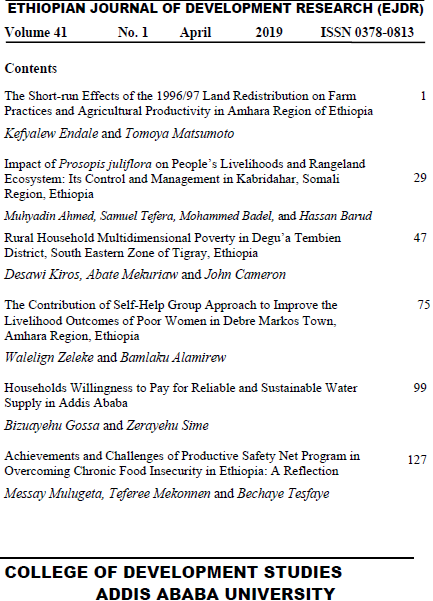Achievements and Challenges of Productive Safety Net Program in Overcoming Chronic Food Insecurity in Ethiopia: A Reflection
Keywords:
Food in/security, poverty, productive safety net, ‘graduation’, EthiopiaAbstract
Food insecurity has been one of the critical socioeconomic problems in Ethiopia.
Recently, there are about 18 million food-insecure people in Ethiopia, of which
around eight million are in emergency situation; while the remaining are in stressed
conditions. Cognizant of this fact, the government of Ethiopia, together with donor
organizations, formulated National Food Security Strategy in 1996 and is currently
implementing the Productive Safety Net Program (PSNP). This paper was,
therefore, designed to reflect on the overall successes and challenges of PSNP in
Ethiopia. Data were collected from relevant literature and organizations. The
findings indicate that PSNP has registered significant achievements including
consumption smoothening, asset protection, rural infrastructure development, and
environmental conservation, though there are growing concerns and challenges
including lack of adequate awareness among stakeholders and the community,
nepotism, dependency syndrome among beneficiaries, poor quality of
infrastructure, debatable graduation processes, low staff quality and turnover,
budget deficiency and inflation of food prices. The overall contemporary situations
related to the existing food insecurity problems and the resultant safety net program
in Ethiopia call for significant transformation of the agricultural sector. In any way,
PSNP of this magnitude should not be a long-lasting strategy for poverty alleviation
in Ethiopia though, with the current situation, safety net programs are compulsory
to protect the poor from further impoverishment and famine-induced deaths. To
make the best of the program, comprehensive planning, well-thought-out genuine
beneficiary recruitment manuals, an adequate understanding of the practices,
efficient utilization of resources and competent leadership are vital.
Downloads
Published
How to Cite
Issue
Section
License
Copyright (c) 2022 Messay Mulugeta, Teferee Mekonnen, Bechaye Tesfaye

This work is licensed under a Creative Commons Attribution 4.0 International License.


